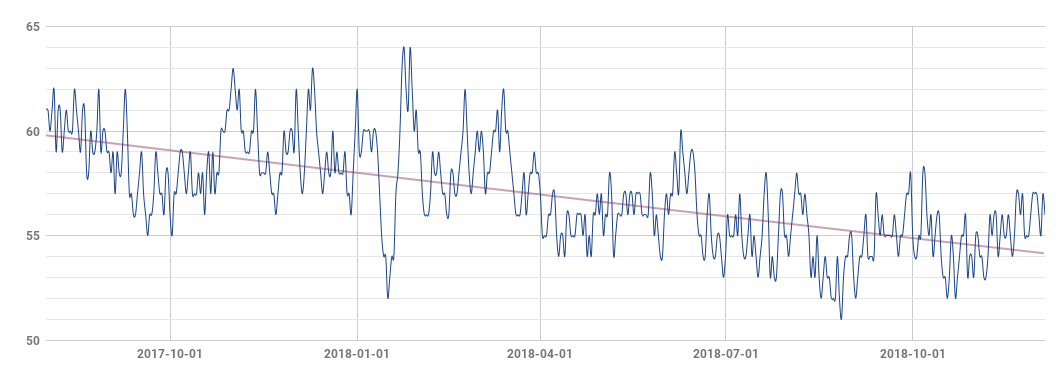Always on Vacation
I’ve been a Fitbit Charge 2 fitness tracker owner for a couple of years now. It tracks steps I’ve taken, floors I’ve climbed and my sleep. When I bought it, I made steps my primary goal. While I already walked a lot, I made sure to walk more to stay healthy. This year, I’ve focused on a different metric my Fitbit tracks: resting heart rate.
Resting heart rate is my heart rate when I’m still. It’s an incredibly important measurement, a grade for my overall health.
The lower resting heart rate, the better. All kinds of factors affect it: exercise, age, emotional state, stress level, diet, hydration level, and body size. For most people, their resting heart rate is between 60 and 100. For professional runners, it can be in the low thirties. You can read more in-depth about resting heart rate here: Fitbit’s 150 billion hours of heart data reveal secrets about health.
I’ve decided to focus on my resting heart rate after my three-week vacation in January. During those weeks in Thailand, my resting heart rate fell to 52, after hovering between 56 and 63 during November and December. It wasn’t the first time I noticed my resting heart rate be lower during prolonged stressless periods.
During November and December, I’ve been quite anxious due to work. Neither good nor sustainable. I’m worse at my job if I’m stressed. I preferred the serenity I’ve felt during my extended vacation. I don’t want to take a vacation to feel calm and relaxed though. I always want to feel calm. When I’m calm, my mood is better, I think better, and I make better decisions.
Resting heart rate is a good indicator of my stress level. I keep a consistent exercise regiment and don’t use an alarm clock (I sleep until I wake up), so it doesn’t get affected by lack fitness of fitness or sleep deprivation.
Here’s the result of my focus, as shown by a graph of my resting heart rate from 2017-08-01 to 2018-12-05:
As you can see above, the overall trend is pretty good until the middle of November. I’ve been feeling under a bit more stress for the last couple of weeks, which is one of the reasons for this post - a reminder to myself, even if my situation has significantly improved.
How did I achieve this trend? I used the same principles, which I’ve outlined in How I Keep 26kg Lost:
- simple rules.
- creating habits and commitment to long-term changes.
- trackable and visible performance gauge.
In this case, the resting heart rate as shown by Fitbit was my performance gauge. It wouldn’t let me cheat and forget the importance of calm.
When my resting heart rate would jump up, I wouldn’t feel stressed about that jump. I understand that long-term is more important than the short-term. Instead, I would reflect on what caused me to feel stressed. I would try and come up with sustainable changes to avoid this stress in the future.
There are situations when short-term stress is unavoidable. For example, before giving a talk. In my experience, this kind of pressure is not reflected in resting heart rate. Neither I want to get rid of that kind of stress. I want to get rid of anxiety that consistently gnaws at me.
The same as with weight, the key was to measure, understand, adjust. Here are some specific adjustments I’ve made in my life:
- I’ve already had most of the notifications turned off. Additionally, I’ve deleted most of my work apps and accounts from my phone. No Slack. No work email.
- I’ve become stricter with how I prioritize and manage my time. I say “no” more often. I pursue fewer opportunities, and I choose what’s most important to me. Some of those choices were difficult.
- I’ve become better at trusting other people and allowing them to help me.
- I read a book before sleep. I’ve been doing that more or less since grade school. This year more than less. It allows my brain to cool down and forget the day’s worries.
There’s still room for improvement before I reach “always on vacation.” Though this goal might be something to be strived for, but never achievable.
I’m happy with the new-found tranquility I feel. I hope that I’ve managed to build new habits which will allow me to keep it long-term.
